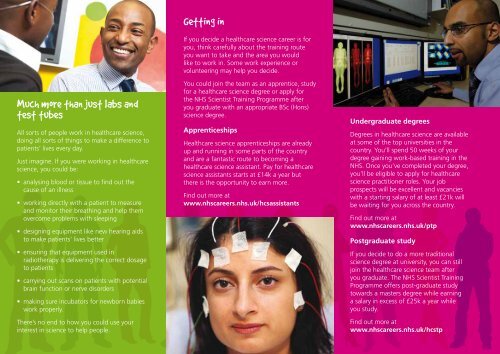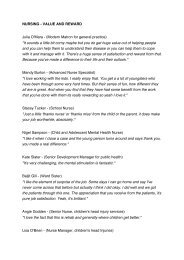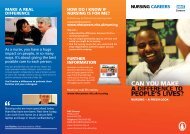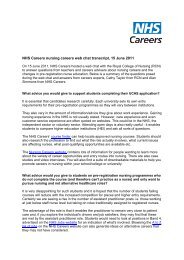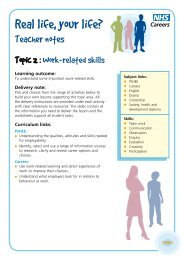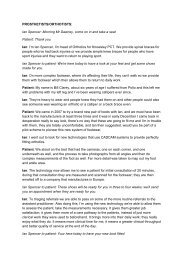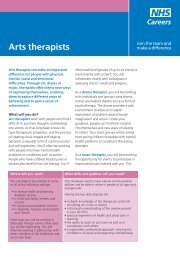leaflet - NHS Careers
leaflet - NHS Careers
leaflet - NHS Careers
You also want an ePaper? Increase the reach of your titles
YUMPU automatically turns print PDFs into web optimized ePapers that Google loves.
Much more than just labs and<br />
test tubes<br />
All sorts of people work in healthcare science,<br />
doing all sorts of things to make a difference to<br />
patients’ lives every day.<br />
Just imagine. If you were working in healthcare<br />
science, you could be:<br />
• analysing blood or tissue to find out the<br />
cause of an illness<br />
• working directly with a patient to measure<br />
and monitor their breathing and help them<br />
overcome problems with sleeping<br />
• designing equipment like new hearing aids<br />
to make patients’ lives better<br />
• ensuring that equipment used in<br />
radiotherapy is delivering the correct dosage<br />
to patients<br />
• carrying out scans on patients with potential<br />
brain function or nerve disorders<br />
• making sure incubators for newborn babies<br />
work properly.<br />
There’s no end to how you could use your<br />
interest in science to help people.<br />
Getting in<br />
If you decide a healthcare science career is for<br />
you, think carefully about the training route<br />
you want to take and the area you would<br />
like to work in. Some work experience or<br />
volunteering may help you decide.<br />
You could join the team as an apprentice, study<br />
for a healthcare science degree or apply for<br />
the <strong>NHS</strong> Scientist Training Programme after<br />
you graduate with an appropriate BSc (Hons)<br />
science degree.<br />
Apprenticeships<br />
Healthcare science apprenticeships are already<br />
up and running in some parts of the country<br />
and are a fantastic route to becoming a<br />
healthcare science assistant. Pay for healthcare<br />
science assistants starts at £14k a year but<br />
there is the opportunity to earn more.<br />
Find out more at<br />
www.nhscareers.nhs.uk/hcsassistants<br />
Undergraduate degrees<br />
Degrees in healthcare science are available<br />
at some of the top universities in the<br />
country. You’ll spend 50 weeks of your<br />
degree gaining work-based training in the<br />
<strong>NHS</strong>. Once you’ve completed your degree,<br />
you’ll be eligible to apply for healthcare<br />
science practitioner roles. Your job<br />
prospects will be excellent and vacancies<br />
with a starting salary of at least £21k will<br />
be waiting for you across the country.<br />
Find out more at<br />
www.nhscareers.nhs.uk/ptp<br />
Postgraduate study<br />
If you decide to do a more traditional<br />
science degree at university, you can still<br />
join the healthcare science team after<br />
you graduate. The <strong>NHS</strong> Scientist Training<br />
Programme offers post-graduate study<br />
towards a masters degree while earning<br />
a salary in excess of £25k a year while<br />
you study.<br />
Find out more at<br />
www.nhscareers.nhs.uk/hcstp


